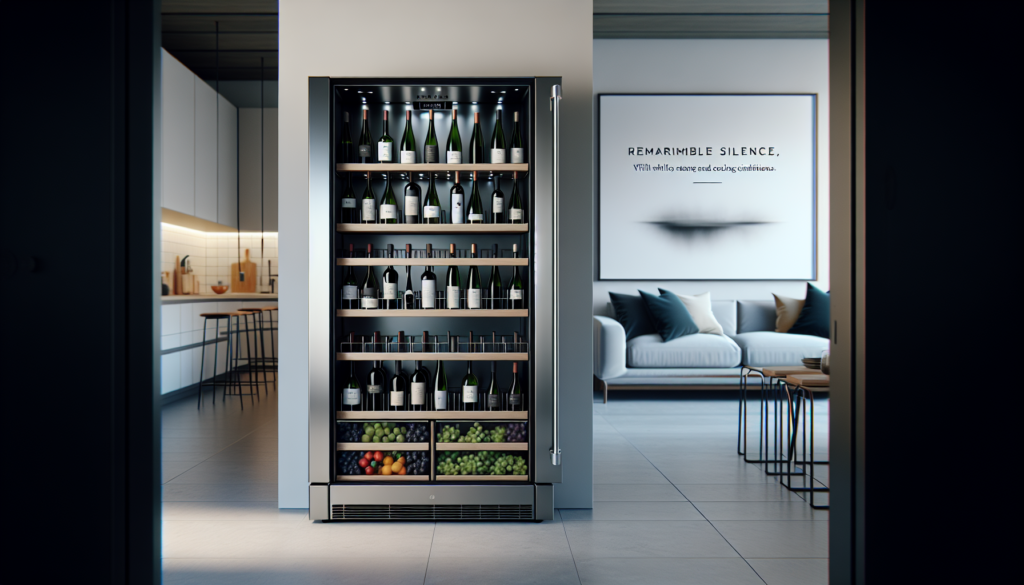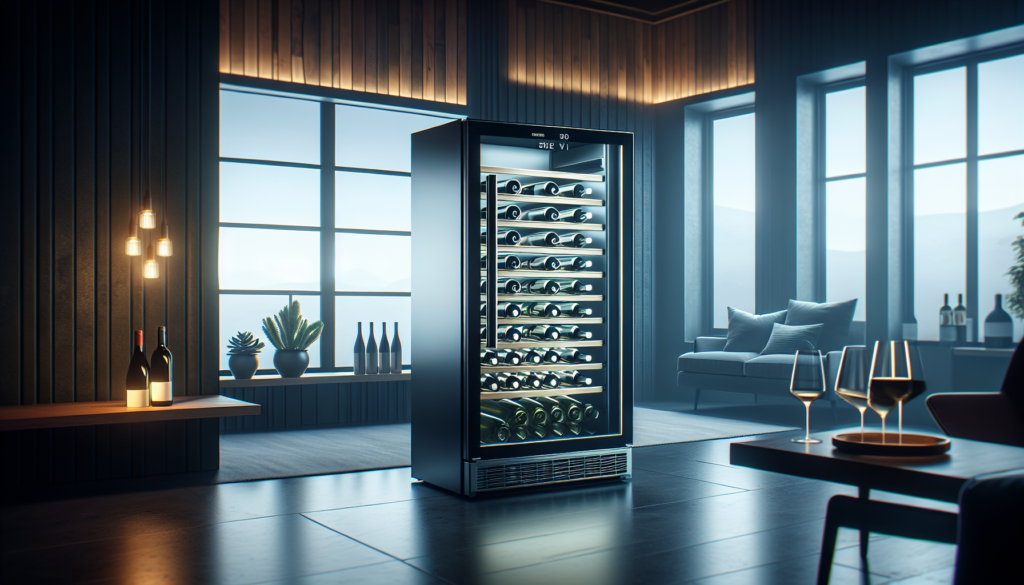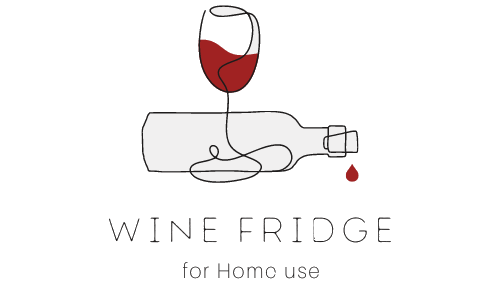If you’re a wine enthusiast who values peace and tranquility, the search for the quietest wine refrigerator ends right here. We all know that the perfect bottle of wine requires optimal conditions to preserve its flavors and aromas, but who wants to deal with the buzzing and humming noises that often come with traditional refrigerators? With the wine refrigerator quietest, you can now store your favorite wines in a serene environment, ensuring they age gracefully without any unwanted disturbances. Say goodbye to noisy appliances and embrace the tranquility that comes with a whisper-quiet wine storage solution.
Factors to Consider When Choosing a Wine Refrigerator

1.1 Size
When choosing a wine refrigerator, one of the first factors to consider is the size of the unit. The size of the wine refrigerator should be determined by the amount of wine bottles you plan to store. Consider your current wine collection and also take into account any future wine purchases you may make. It’s important to choose a wine refrigerator that can accommodate your needs without overcrowding the bottles.
1.2 Cooling Technology
The cooling technology used in a wine refrigerator is another important factor to consider. Different models may use different cooling mechanisms, such as compressor cooling or thermoelectric cooling. Compressor cooling is more powerful and efficient, but it tends to produce more noise. On the other hand, thermoelectric cooling is quieter but may not be as effective in cooling larger wine collections. It’s essential to weigh the pros and cons of each cooling technology before making a decision.
1.3 Noise Level
The noise level of a wine refrigerator can significantly impact your overall experience. Noisy appliances can be disruptive, especially if your wine refrigerator is placed in a living area or a room where you spend a lot of time. Therefore, it’s crucial to choose a wine refrigerator with a low noise level. Look for models that are specifically designed to operate quietly, with noise levels below 40 decibels. This will ensure that your wine refrigerator doesn’t disturb your peace and tranquility.
1.4 Energy Efficiency
Energy efficiency is an important consideration when choosing a wine refrigerator. By opting for an energy-efficient model, you can not only reduce your carbon footprint but also save on electricity bills. Look for wine refrigerators with energy-saving features such as LED lighting, adjustable temperature controls, and low-power consumption. An energy-efficient wine refrigerator will not only benefit the environment but also your wallet.
1.5 Price
Price is always a consideration when purchasing any appliance, including wine refrigerators. Set a budget for yourself and choose a wine refrigerator that offers the best value for your money. Consider the features, size, noise level, and energy efficiency of different models within your budget range. Remember, while it’s essential to find a wine refrigerator that meets your needs, it’s not necessary to break the bank. There are many affordable options available that still provide high-quality cooling and quiet operation.
Benefits of Having a Quietest Wine Refrigerator
2.1 Preservation of Wine Quality
One of the primary benefits of having the quietest wine refrigerator is the preservation of wine quality. Excessive noise and vibrations can negatively affect the aging process of wine. Loud noises can disturb sediment in the bottles, potentially altering the flavor and aromas. By choosing a quiet wine refrigerator, you ensure that your wine remains undisturbed, allowing it to age gracefully and maintain its optimal quality.
2.2 Aesthetics and Design
Aside from functionality, the aesthetics and design of a wine refrigerator are crucial for many wine enthusiasts. A quiet wine refrigerator often features a sleek and modern design, seamlessly integrating into your home decor. The absence of noise-emitting components allows for a seamless and elegant wine storage solution that enhances the visual appeal of your space.
2.3 Noise Reduction for Peaceful Environment
Having a quiet wine refrigerator contributes to creating a peaceful and tranquil environment. Unwanted noise can be disruptive, especially in areas where you relax, entertain, or work. By investing in a quiet wine refrigerator, you ensure that there are no distractions or disturbances caused by noisy appliances. This enhances the overall ambiance and allows you to fully enjoy your space.
2.4 Energy Savings
Choosing a quiet wine refrigerator often goes hand in hand with selecting an energy-efficient model. By opting for a refrigerator with low noise levels, you are often selecting one that is designed with energy-saving features. These features include improved insulation, efficient cooling mechanisms, and smart temperature controls. By investing in an energy-saving wine refrigerator, you not only reduce noise but also save on your electricity bills in the long run.
The Quietest Wine Refrigerators on the Market
3.1 Brand A
Brand A offers a range of wine refrigerators known for their whisper-quiet operation. These models utilize advanced noise reduction technology, including specially designed compressors and vibration dampening systems. With noise levels as low as 35 decibels, Brand A is an excellent choice for those seeking a truly peaceful wine storage experience.
3.2 Brand B
Brand B is renowned for its commitment to creating silent wine refrigerators. Their models incorporate innovative cooling technology to minimize noise while providing optimal temperature control for your wine collection. With noise levels consistently below 40 decibels, Brand B offers both a quiet and reliable solution for wine enthusiasts.
3.3 Brand C
Brand C has established itself as a leader in producing quiet wine refrigerators. Their models combine state-of-the-art noise reduction features with elegant design elements. With noise levels ranging from 38 to 42 decibels, Brand C offers a range of options for those seeking a balance between silence and performance.

3.4 Brand D
Brand D is known for its commitment to engineering wine refrigerators with minimal noise output. Their models utilize cutting-edge technology to provide whisper-quiet operation. With noise levels averaging at 35 decibels, Brand D offers an excellent choice for wine connoisseurs who value peace and tranquility.
3.5 Brand E
Brand E is a trusted name in the industry, offering a variety of wine refrigerators known for their low-noise operation. Their models feature advanced insulation and specialized components to eliminate noise and vibration. With noise levels below 40 decibels, Brand E provides a range of options for those looking to store their wine collection in a serene environment.
Tips for Maintaining a Quiet Wine Refrigerator
4.1 Regular Maintenance and Cleaning
To ensure your wine refrigerator continues to operate quietly and efficiently, it’s essential to perform regular maintenance and cleaning. Clean the interior and exterior of the refrigerator regularly, remove any dust or debris, and check for any loose parts. Additionally, inspect the door seals to ensure they are tight and properly seal the unit. Regular maintenance will prevent any potential issues that could lead to increased noise levels.
4.2 Proper Placement and Ventilation
Proper placement and ventilation are crucial for maintaining a quiet wine refrigerator. Ensure that there is sufficient space around the unit for proper air circulation. Avoid placing the refrigerator near heat sources or in direct sunlight, as this can cause the unit to work harder and produce more noise. Additionally, consider placing the refrigerator on a stable surface to avoid any vibrations that could contribute to increased noise levels.
4.3 Insulation Improvements
If you are experiencing higher noise levels from your wine refrigerator, consider improving its insulation. Adding additional insulation around the unit can help reduce noise transmission and vibrations. Insulation materials such as foam or acoustic panels can be applied to the sides and back of the refrigerator to absorb sound and create a quieter operation.
4.4 Noise Dampening Solutions
If your wine refrigerator still produces unwanted noise, consider using noise dampening solutions. These can include placing anti-vibration pads or mats under the refrigerator to absorb vibrations. Additionally, using soundproofing curtains or acoustic panels around the area where the refrigerator is located can help minimize noise transmission to the surrounding environment.
4.5 Checking and Replacing Parts
If all else fails, it may be necessary to check and replace any faulty or worn-out parts in your wine refrigerator. Components such as fans, motors, and compressors can contribute to increased noise levels if they are not functioning properly. Consult the manufacturer’s manual or contact a professional technician to identify and replace any parts that may be causing excessive noise.
Comparing Wine Refrigerator Noise Levels
5.1 Decibel Rating and Noise Measurements
When comparing wine refrigerator noise levels, it’s crucial to take into account the decibel rating and noise measurements. The decibel (dB) scale measures the intensity of sound. The lower the decibel rating, the quieter the wine refrigerator. It’s recommended to look for models with noise levels below 40 decibels for a truly quiet operation.
5.2 Analysis of Noise Level Data
Analyzing noise level data can provide valuable insights when comparing wine refrigerators. Pay attention to the specific noise levels at different settings, such as when the compressor is running or when the fan is operating. Additionally, consider any customer reviews or expert opinions that provide feedback on the actual noise levels experienced during everyday use. This analysis will help you make an informed decision and choose the quietest wine refrigerator that meets your needs.
How to Reduce Noise from an Existing Wine Refrigerator
6.1 Soundproofing Methods
If you already have a wine refrigerator that produces significant noise, there are soundproofing methods you can employ to reduce it. Apply soundproofing materials to the walls or cabinets surrounding the refrigerator. These materials absorb and dampen sound waves, reducing noise transmission. Adding weather stripping to the door seals can also help minimize noise leakage. Employing soundproofing techniques can significantly reduce the noise generated by an existing wine refrigerator.
6.2 Fan Speed Controls
Some wine refrigerators come equipped with fan speed controls, allowing you to adjust the fan’s speed to reduce noise levels. Lowering the fan speed can result in quieter operation without compromising on cooling efficiency. If your wine refrigerator has this feature, experiment with different fan speed settings to find the optimal balance between noise reduction and performance.
6.3 Vibration Reduction Techniques
Vibration can contribute to the noise produced by a wine refrigerator. To minimize vibration, ensure that the unit is leveled properly. Adjust the leveling feet or use shims to create a stable and balanced position for the refrigerator. Additionally, consider placing anti-vibration pads or mats under the refrigerator to further absorb vibrations and reduce noise.
Conclusion
When choosing a wine refrigerator, it’s essential to consider factors such as size, cooling technology, noise level, energy efficiency, and price. Opting for the quietest wine refrigerator offers numerous benefits, including the preservation of wine quality, enhanced aesthetics and design, a peaceful environment, and energy savings. Brands such as A, B, C, D, and E offer some of the quietest wine refrigerators on the market, each with unique features and noise reduction technology. To maintain a quiet wine refrigerator, regular maintenance, proper placement, insulation improvements, noise dampening solutions, and checking/replacing faulty parts are essential. When comparing wine refrigerator noise levels, analyze decibel ratings and noise measurements to make an informed decision. If you have an existing wine refrigerator that produces excessive noise, employ soundproofing methods, utilize fan speed controls, and apply vibration reduction techniques. By considering these factors and implementing the recommended tips, you can find or create a truly quiet wine refrigerator that meets your needs and enhances your wine storage experience.
